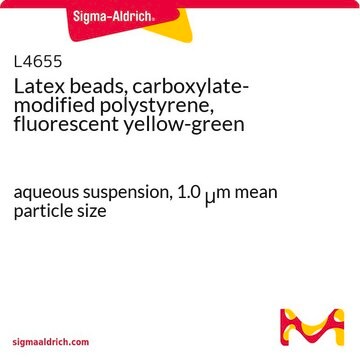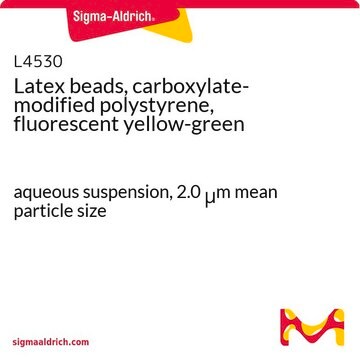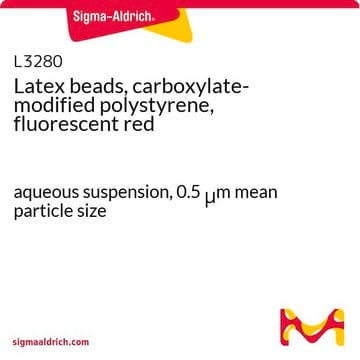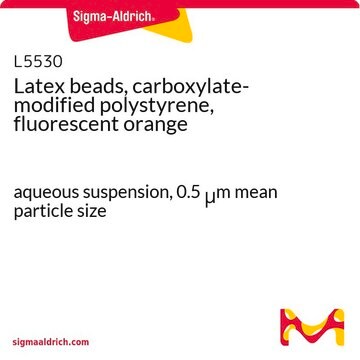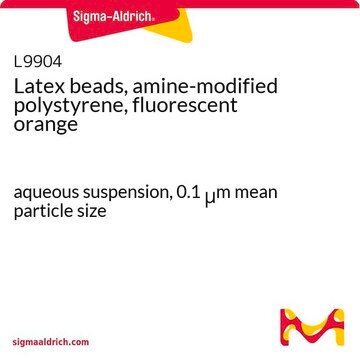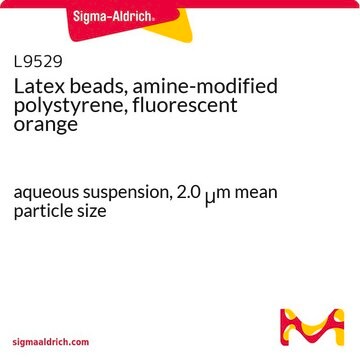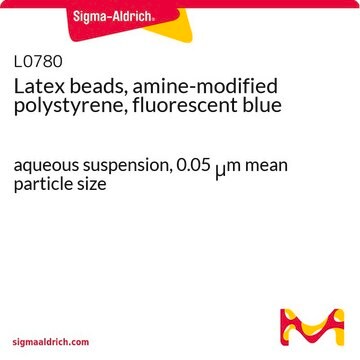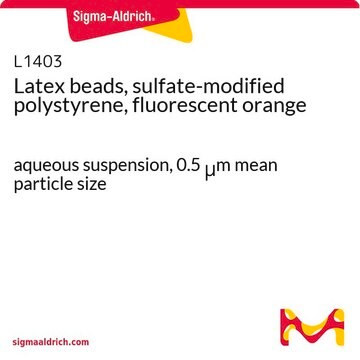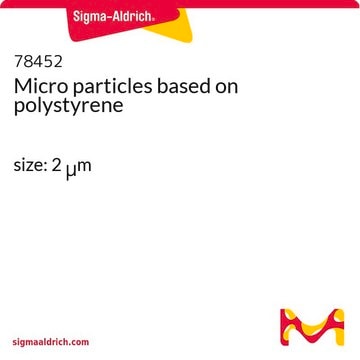L3030
Latex beads, carboxylate-modified polystyrene, fluorescent red
aqueous suspension, 2.0 μm mean particle size
Sinónimos:
Fluorescent latex beads
Iniciar sesiónpara Ver la Fijación de precios por contrato y de la organización
About This Item
Productos recomendados
Formulario
aqueous suspension
Nivel de calidad
contiene
0.1% NaN3
composición
Solids, 2.5%
técnicas
cell based assay: suitable
tamaño medio de partícula
2.0 μm
fluorescencia
λex ~575 nm; λem ~610 nm
aplicaciones
cell analysis
¿Está buscando productos similares? Visita Guía de comparación de productos
Aplicación
Carboxylate-modified polystyrene latex beads have been used to collect morphofunctional data about the immune systems of Carabus lefebvrei, a helicophagous Italian endemic ground beetle often used as an indicator of the habitat quality of the Apennines mountain forests. Carboxylate-modified polystyrene latex beads have also been used to inform comparative studies on immunity defense mechanisms of adults and larvae of the coleopteran Cetonischema aeruginosa and to investigate the phagocytic activity of cultured rat thyroid cells.
Código de clase de almacenamiento
10 - Combustible liquids
Clase de riesgo para el agua (WGK)
WGK 2
Punto de inflamabilidad (°F)
Not applicable
Punto de inflamabilidad (°C)
Not applicable
Elija entre una de las versiones más recientes:
¿Ya tiene este producto?
Encuentre la documentación para los productos que ha comprado recientemente en la Biblioteca de documentos.
Los clientes también vieron
X Lan et al.
Clinical and experimental immunology, 203(2), 286-303 (2020-10-03)
Growing evidence shows that a homozygous 6·7-kb deletion of the novel anti-inflammatory molecule leukocyte immunoglobulin-like receptor A3 (LILRA3) is associated with many autoimmune disorders. However, its effects on pathogenesis of inflammatory bowel disease (IBD) have yet not been clarified. LILRA3
Steve J Webster et al.
Journal of immunology (Baltimore, Md. : 1950), 185(5), 2968-2979 (2010-07-27)
Peripheral blood monocytes represent the rapid response component of mononuclear phagocyte host defense, generating vigorous but finite antibacterial responses. We investigated the fate of highly purified primary human monocytes following phagocytosis of different bacteria. Exposure to high bacterial loads resulted
Xun Chen et al.
International journal of stem cells, 14(3), 331-340 (2021-04-29)
To investigate the effect and the underlying mechanism of exosomes secreted by human umbilical cord mesenchymal stem cells (hUCMSCs) on diffuse alveolar hemorrhage (DAH) in murine lupus. Exosomes were extracted from cultured hUCMSCs by ultracentrifugation. The expressions of exosome markers
Simon A Johnston et al.
Scientific reports, 6, 20977-20977 (2016-02-18)
Cryptococcus neoformans is a fatal fungal pathogen of humans that efficiently parasitises macrophages. Birds can be colonised by cryptococci and can transmit cryptococcosis to humans via inhalation of inoculated bird excreta. However, colonisation of birds appears to occur in the
Marc Daigneault et al.
PloS one, 5(1), e8668-e8668 (2010-01-20)
Differentiated macrophages are the resident tissue phagocytes and sentinel cells of the innate immune response. The phenotype of mature tissue macrophages represents the composite of environmental and differentiation-dependent imprinting. Phorbol-12-myristate-13-acetate (PMA) and 1,25-dihydroxyvitamin D3 (VD(3)) are stimuli commonly used to
Nuestro equipo de científicos tiene experiencia en todas las áreas de investigación: Ciencias de la vida, Ciencia de los materiales, Síntesis química, Cromatografía, Analítica y muchas otras.
Póngase en contacto con el Servicio técnico